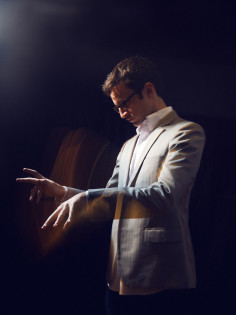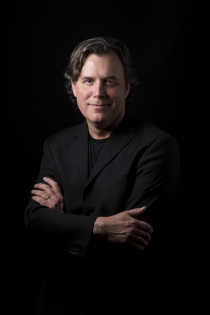Art Mag’s Exclusive Spoleto Festival Coverage
My very first Music In Time performance was a initiation by fire of sorts, as it was marvelously challenging. Director and Host John Kennedy introduced the evening’s program as a musical expression of minimalism by European descent, drilling further to German origin, by Hans Otte (b. 1926), “an Artist with a capital A,” according to pianist Conor Hanick. Hanick further explained that The Book of Sounds is a crazy piece of music, at whose heart the act of listening is the paramount endeavor.
“This piece is trying to get the core of what it means to play, to listen to music,” Hanick says, deeming it the nerdiest and most elemental expression of both, achieved by “stripping away the baggage.” Hanick also calls Otte’s The Book of Sounds one of the real masterpieces of 20th century Minimalism. He explains that is more than just the aesthetic of Minimalism but also the process to get at it, like repeating a word over and over–but more interesting.
As Hanick sits at a gorgeous Yamaha grand piano, he personifies the solemnity and focus that I imagine Otte must have called upon to write this piece of music in 12 parts. Before the show began, Kennedy asked the audience how many of us really understood what we were about to hear, to which a paltry two to three hands raised. It was only as Hanick entered the trance-like state of playing that I personally understood. It was incredible.
At times, the repetitive sounds were both simple yet profound. Looking around at the audience, it also seemed like the perfect track for a sleep machine. Many dozing patrons were periodically roused by emphatic notes sprinkled throughout the composition. A few folks left. But don’t blame them.
Every time I take a willing friend or family member to any art museum, I always lose them at the Contemporary and/or Minimalist wing of the museum. For some, it is just too far removed from their taste or comfort level. And that’s OK.
Hanick’s performance was so intelligent and fascinating that it made me sad that I am not a trained musician and cannot more accurately explain the compositions and nuances that my musically gifted friends enjoyed. But I bet if I did, you’d stop reading this review, if you hadn’t already.
The only way one can confidently speak about art, or any subject, is through consistent study. Devoted study gives one the context in which to place a work of art, and the vocabulary to define what makes it superior to other lesser works. You can’t fake it or phone it in.
I am so pleased that I will be seeing Hanick play again on June 2, for The Concord Sonata, a musical study of Transcendental authors of 19th century New England (Emerson, Hawthorne, the Alcotts, and Thoreau). Yes, this is just the gloriously nerdy thing for me. I cannot wait to see it, as I suspect that performance will give authority to my personal assessment of Hanick as an honest and exemplary musician. John Kennedy wouldn’t invite him back three times if he wasn’t.
Future Music In Time Performances: The Concord Sonata, June 2, 5 pm at the Simons Center Recital Hall at College of Charleston. Tickets
Words: Stacy Huggins
Images courtesy Spoleto Festival USA
Categories: Performing Arts, Review
Tags: Conor Hancik, Hans Otte, John Kennedy, Music In Time, Piano, Spoleto, Spoleto 2015, Spoleto Festival 2015, Spoleto Festival Usa, The Book Of Sounds, The Concord Sonata







Comments (0)
No comments yet
The comments are closed.